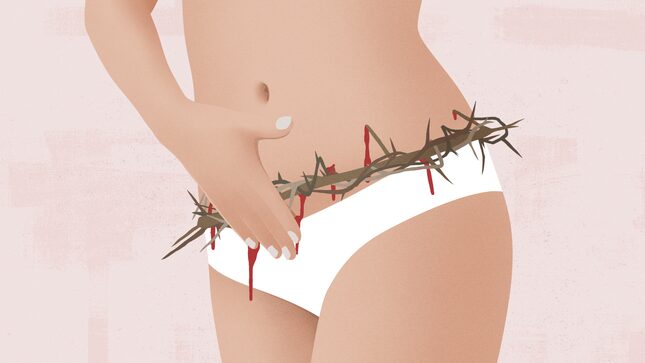Women’s Bodies Are Bearing the Brunt of Purity Culture
Raised to associate their bodies with shame, women are now dealing with painful sex, severe bleeding, and increasingly unavoidable pregnancy.
In DepthIn Depth
Illustration: Rebecca Fassola
Alyssa pushed through the pain each time she had sex with her husband. It was sharp. It stung and it burned. He had no idea. She endured it because she was a good wife.
“Men need to be sexually satisfied, minimally once every 72 hours; after that they start to get sexually frustrated.” That academic tidbit came from Alyssa’s college class “Psychology of Marriage and Family” at Liberty University, where she learned to be a satisfactory wife and mother with evangelical values. She’d learned this same lesson through her upbringing in a Southern Baptist household in Virginia that also dipped its toe into more fundamentalist teachings. What she wasn’t taught was that burning during sex could be the result of vaginal tearing—tearing that would swell then heal thicker into a bump that would be retraumatized each time she had sex with her husband. Every 72 hours, give or take.
Alyssa, who requested to go by her first name only, wasn’t taught how to understand her own body, only how to preserve its purity before she married. As she explained it to me, “Just keep your tatas covered and your legs closed, lest you be a complete slut.”
Purity culture became a fully fledged youth movement in the ‘90s—although the belief system existed long before—with successful books like Joshua Harris’ I Kissed Dating Goodbye. The movement emphasized virginity as an active pursuit rather than just a denial of the flesh, pulling from Bible verses about remaining celibate before marriage while also making sure you did marry, because “it is better to marry than to burn with passion” (1 Corinthians 7:9). At purity balls, teen girls wore white ruffled gowns and were escorted by their fathers. T-shirts with “Love Can Wait” and “Virginity Rocks” written across them sold out. Teens across the country slipped on silver promise rings, just like the 2000s crop of Disney stars (the Jonas Brothers, Selena Gomez, Miley Cyrus, and Demi Lovato).
Purity culture also led to ignorance and shame: an ignorance of our own bodies and a feeling of shame that precluded seeking medical help. Instead, many Christian women—and anyone else who fell across purity culture’s path—developed the mindset that reproductive system-related pain was a result we must endure, because Eve gave Adam that apple. “I will greatly multiply your sorrow and your conception; in pain you shall bring forth children,” the Bible reads (Genesis 3:16). The message was bear the vaginal tears, push through the excruciating menstrual pain, be plagued by yeast infections, suffer from other undiagnosed maladies. Now, in this post-Roe era, politicians are doubling down on purity culture talking points and attempting to correct those who betrayed purity culture values by forcing them to endure the physical dangers of pregnancy.
Endure in ignorance is exactly what Alyssa, who experienced burning, stinging pain during sex, did.
The physical tolls of purity culture on women’s health
Before the year 2000, 70 percent of American adults attended church; a vast majority were Christians. Most of us had our asses dragged there by parents. Some of us stayed. Many left. But the unforgiving “rules” of purity culture undoubtedly impacted many of us.
“I’ve seen so many patients who thought sex should just hurt, so they never sought care or thought they could talk to their doctors about it and suffered silently. All because we’ve been told women who want sex to feel good are whores,” Dr. Jennifer Lincoln, an OBGYN in Portland, Oregon, and author of Let’s Talk About Down There, told me. Lincoln herself grew up in purity culture. “I went to college uninformed and filled with judgement of those who chose to have sex and get ‘what they deserved’ if they ended up with an STI or pregnant,” she said. “It took seeing the actual consequences and getting the other side of the story to see I had been told half-truths and was basically shamed into not asking questions.”
-

-

-

-

-

-

-

-

-

-

-

-

-

-

-

-

-

-

-

-

-

-

-

-

-

-

-

-

-

-

-

-

-

-

-

-

-

-

-

-








































